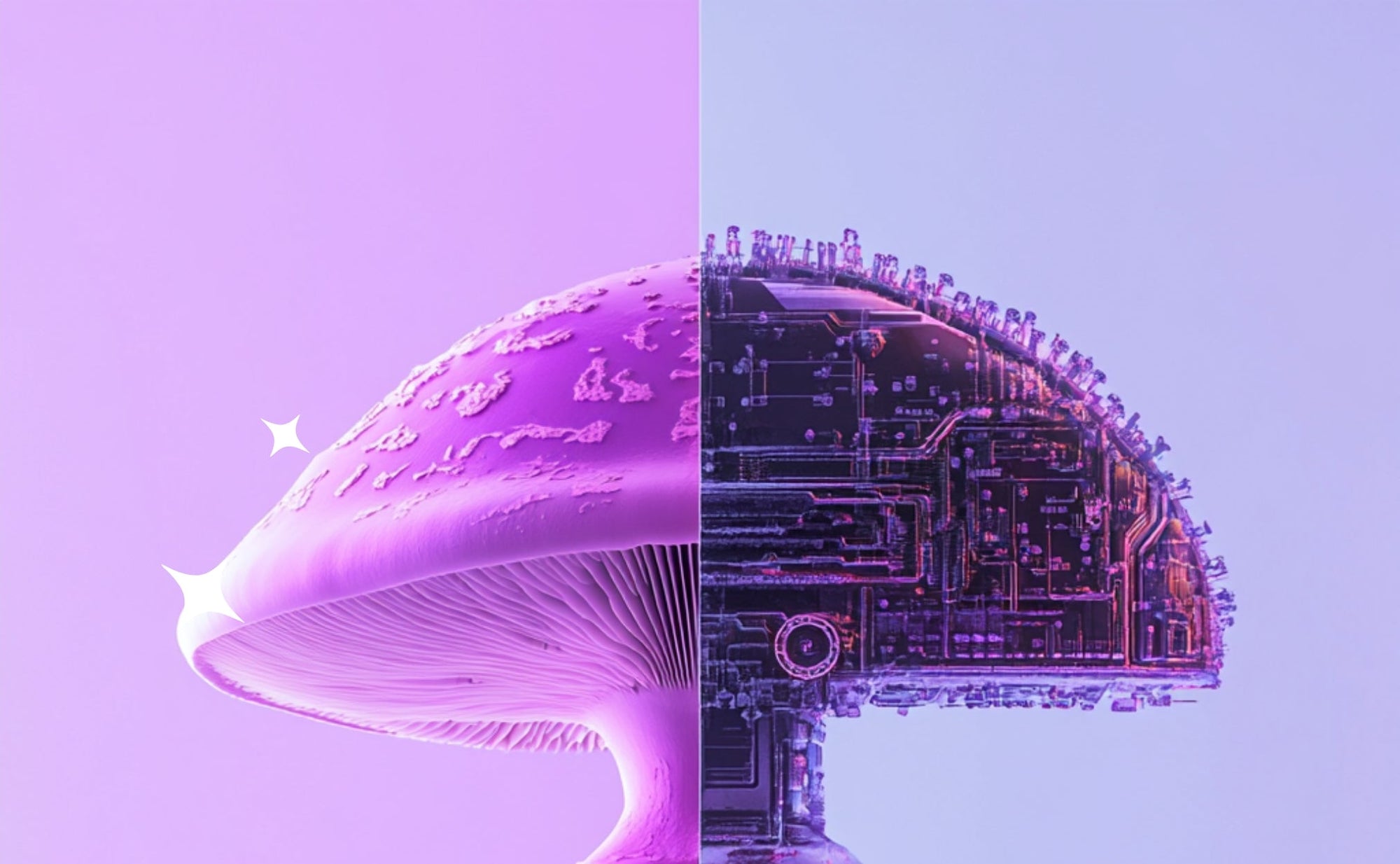

· By Peyton Masteller
Tech Meets Fungi: Why Big Tech and Mushrooms Are a Perfect Pair
In the world of innovation and growth, Big Tech and mushrooms might seem like an unlikely duo. However, they share remarkable similarities, especially when you dive deeper into their transformative powers in both science and society. Let’s explore why these two are, indeed, “a perfect pair”:
1. The Power of Innovation and Growth
Just as Big Tech has shaped the modern world with its groundbreaking technologies, mushrooms—specifically functional mushrooms—are quietly revolutionizing wellness and science. The tech industry thrives on the principle of innovation: creating new solutions, optimizing efficiency, and fostering global change. Similarly, mushrooms (like lion’s mane, reishi, and cordyceps) are emerging as a breakthrough in holistic health, offering cognitive, immune, and energy-boosting benefits that align with today’s focus on mental clarity and physical wellness.
Both sectors are about tapping into untapped potential—whether it’s through new tech tools or unlocking the healing power of nature.
2. A Focus on Networked Systems
Big Tech thrives on networking—creating systems that connect people, devices, and data globally. A mushroom is, in a sense, a natural network. The mycelium (the root system of fungi) acts like a biological internet, linking individual plants, trees, and ecosystems in a vast, interconnected web. Just as tech companies build platforms to connect the world, mushrooms operate as the natural world’s communicators, ensuring sustainability and balance across environments.
Both industries depend on collaboration, interconnection, and systems thinking. Without a functional ecosystem—whether technological or biological—neither can function optimally.
3. The Intersection of Wellness and Mental Health
Mental health is a growing concern in the tech industry. From long hours at the screen to burnout, tech workers and consumers alike face significant stress and pressure. Mushrooms—specifically psychedelic mushrooms like psilocybin—are now seen as potential tools in mental health treatments. Research suggests they can help people process trauma, reduce anxiety, and unlock creative pathways in the brain. Just as tech is innovating ways to optimize human productivity, mushrooms are doing the same by offering solutions to mental health and emotional well-being.
Tech is now investing in this area, with various companies exploring the potential of psychedelic-assisted therapies for treating mental health conditions, showing a fascinating overlap between the two industries.
4. Sustainability and the Green Tech Movement
With climate change at the forefront of the global agenda, both Big Tech and mushrooms are being championed as agents of sustainability. Mushrooms have a unique ability to decompose organic matter, clean up polluted environments, and even create sustainable materials. Many tech companies are turning to mushroom-based solutions for biodegradable packaging, eco-friendly textiles, and building materials.
Big Tech companies are now investing in green technologies to reduce their carbon footprint, and mushrooms, with their ability to regenerate and restore, are a perfect complement to these efforts. It’s a marriage of nature’s power and technological innovation, striving for a more sustainable and environmentally conscious future.
5. Uncharted Territory
Both Big Tech and mushrooms explore uncharted territories. Big Tech constantly pushes the boundaries of what’s possible in computing, artificial intelligence, and human-machine interaction. Mushrooms, on the other hand, are still being studied for their full potential in medicine, ecology, and wellness. This shared pursuit of discovery and exploration—whether in cyberspace or the natural world—drives each sector to innovate and question the status quo.
The Future: Mushrooms in Tech’s Ecosystem
As more Big Tech companies invest in health and wellness, and as functional mushrooms continue to gain popularity in the wellness industry, the two realms are bound to collide more frequently. Expect collaborations between biotech startups and psychedelic research companies, the integration of mycelium-based products in tech manufacturing, and even virtual wellness platforms utilizing mushroom science to improve cognitive function.
In the end, Big Tech and mushrooms are not only symbiotic in their complementary roles—they are part of a broader narrative: a future where innovation and well-being are intertwined. The future of both industries, rooted in creativity, sustainability, and mental health, promises a truly exciting journey ahead.
Conclusion
From providing new forms of therapy to building interconnected systems, Big Tech and mushrooms share a deep connection based on growth, exploration, and transformation. As both fields continue to evolve, expect them to support and amplify each other in the drive to create a healthier, more sustainable world. The future is fungal, and it’s a tech-powered one.